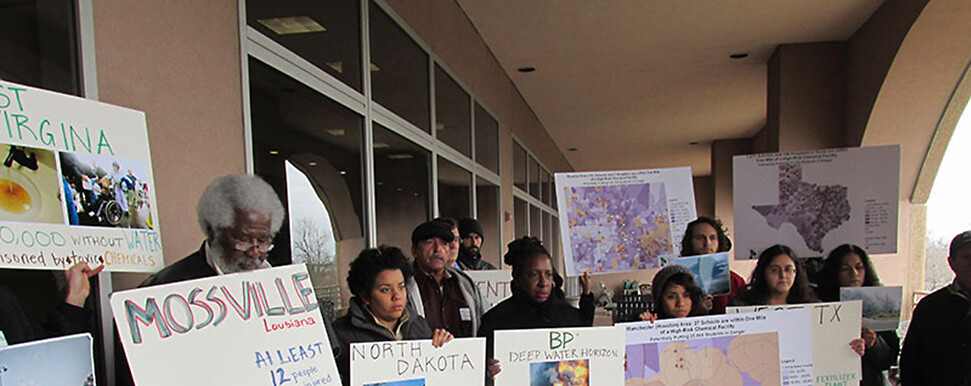
Media
April 6, 2023EPA Action to Reduce Cancer-Causing Air Pollution Is Critical and Long Overdue
Media Contact: Deidre Nelms, dnelms@comingcleaninc.org (802) 251-0203 ext. 711
Today, the U.S. Environmental Protection Agency (EPA) proposed a rule to significantly reduce emissions of toxic and other harmful air pollution from chemical plants, intended to reduce air toxics-related cancer risks in fenceline communities.
Coming Clean and the Environmental Justice Health Alliance for Chemical Policy Reform (EJHA) applauded the EPA for committing to take action to dramatically reduce emissions of cancer-causing chemicals from chemical and polymer plants. Under the proposed rule, these facilities will be required to conduct fenceline air monitoring to ensure compliance with new regulations, a priority for fenceline communities who have testified and submitted comments to the EPA in recent years.
Right now, chemical and plastics manufacturing facilities release chemicals like ethylene oxide, chloroprene, benzene, 1,3-butadiene, ethylene dichloride and vinyl chloride into neighborhoods with frequency, elevating cancer rates in communities in Louisiana, Texas, Kentucky, and West Virginia and many other states. Communities of color and low-income communities are disproportionately burdened by health-harming air pollution. Many families have already lost loved ones to cancer and other illnesses caused or exacerbated by air pollution.
"Justice has been delayed and denied to communities of color and low-income communities in West Virginia and elsewhere dealing with these toxic air burdens for over 100 years,” said Maya Nye, Federal Policy Director for Coming Clean and member of EJHA affiliate People Concerned About Chemical Safety. “The devil is in the details, but I am optimistic that this proposal is a step in the right direction. I just hope that action is taken soon enough for our elders to benefit."
For many years, fenceline communities have demanded accountability and real pollution reductions. Specifically, Coming Clean, EJHA, and the fenceline communities in both networks have called on EPA to:
- Require all facilities that use or store hazardous chemicals to maintain a real-time air monitoring system;
- Take action to address cumulative impacts that multiple pollutants from multiple facilities have on fenceline communities;
- Use its authority to require emission reductions and eliminate emissions that threaten public health;
- Close illegal Startup, Shutdown and Malfunction loopholes and other malfunction exemptions that allow facilities to emit harmful air pollution with impunity in the case of power loss and equipment failure.
- Redress the legacy of environmental racism that has created communities like Mossville, Louisiana– where contamination to the land, water, and air make it unsafe for the residents of this historic Black community to remain due to the historic and ongoing assault of toxic pollution from over a dozen hazardous facilities – and heed Mossville residents’ call to be made whole by a fair and just relocation process.
“Administrator Regan’s important announcement today will go a long way to protecting many EJ communities in LA, TX and around the country. We applaud what we know so far about the new rules and thank the Administrator for coming back to Louisiana to make the announcement,” said Michele Roberts, National Co-Coordinator of EJHA. “Unfortunately there are some communities, such as the historic Black community of Mossville, LA that have been so ravaged by the legacy and ongoing impacts of toxic pollution that even with these new rules it is impossible to remain safely in place. Residents of Mossville also met with Administrator Regan and elevated their years-long plea for a fair and just relocation; they are still anxiously awaiting the Administrator’s reply.”
"This rule is a good start to something that needs to be applied to all chemical emissions,” said Eboni Cochran, member of Rubbertown Emergency ACTion in Louisville, Kentucky. “The requirement of fence line air monitoring instead of the reliance on self-reported industry data is a big step in the right direction."
